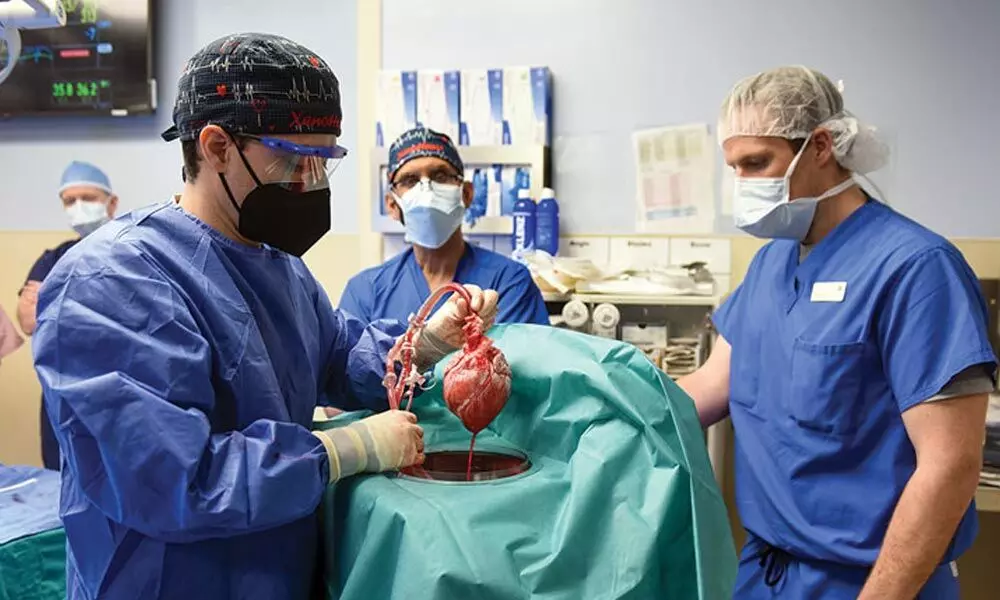Things Doctors Kept In Mind While Performing The First Pig-To-Human Heart Transplantation

Surgeons examine the genetically engineered pig heart transplanted into a person last week. (Photo/science)
- Surgeons claimed that they had conducted the world's first pig heart transplant on a person.
- The xenotransplantation surgery on January 7th was a watershed moment in xenotransplantation research.
Surgeons claimed that they had conducted the world's first pig heart transplant on a person. The xenotransplantation surgery on January 7th was a watershed moment in xenotransplantation research. Although it's uncertain how well or how long the heart will function, experts believe that the procedure will one day be able to compensate for a lack of human organs for sick people.
The procedure was a significant procedure for many other experimental innovations aimed at keeping the pig heart functioning in a human chest. The complicated procedure was influenced by science and ethical issues.
According to Muhammad Mohiuddin, director of the cardiac xenotransplantation programme at UMSOM, David Bennett, 57, was a transplant patient with severe heart failure and ventricular fibrillation, a kind of arrhythmia. Physicians at the University of Maryland Medical Center and nearby institutions ruled him unsuitable for a human heart transplant since he had not obtained measures to manage his high blood pressure and other health issues.
He was given a heart from a genetically engineered pig manufactured by Revivicor, a biotech company, by the Food and Drug Administration (FDA). For years, Mohiuddin and his colleagues have worked with Revivicor-supplied pig organs. They announced in 2016 that pig hearts transplanted into a baboon's belly could stay healthy for more than two years, and they've now done transplants into baboons' chests, where the hearts keep the baboons alive. According to Mohiuddin, baboons fed Revivicor's pig hearts lived for up to 9 months in new research.
The gene for a growth hormone receptor was removed as a final tweak to lessen the likelihood that a pig organ, nearly matched in size to the patient's chest, would outgrow it once transplanted. Mohiuddin and colleagues announced in September 2021 that this mutation slowed the growth of pig hearts transplanted into baboons, a development they hope will help people avoid heart failure.
The UMSOM team tested baboons with progressively more genetic changes and found that their hearts were living longer. However, baboon tests are expensive, and a study's limited number of animals makes it difficult to assess the effects of each alteration separately. The need for consistency may limit the number of human genes added as xenotransplantation scales up to treat more people, Tector notes. Makana Therapeutics, which he established, was bought by Recombinetics Inc., which is planning to begin a clinical study of genetically altered pig-to-human kidney transplants this year.
Bennett is being given a strong immunosuppressant by the UMSOM team, despite the cardiac alterations, to prevent rejection: an investigational antibody medication called KPL-404, developed by Kiniksa Pharmaceuticals, Ltd. Standard immunosuppressants used in human-to-human organ transplants are ineffective if the immune system produces a large number of antibodies towards the organ, as surgeons suspected with the pig heart.
Apart from immune rejection, pig hearts transplanted into baboons appear to sputter out in a couple of days unless they're pre-perfused with a nutritional solution, according to Mohiuddin. The mechanics behind the hearts' failure remain unknown, but he believes that removing the organ from the pig's chest depletes the energy-producing mitochondria in the organ's cells.
For keeping and treating the donor heart after it was extracted, the UMSOM team used a technology invented by Lund University surgeon Stig Steen and marketed by the Swedish business XVIVO. The heart is immersed in a flowing broth containing water, chemicals including adrenaline and cortisol, as well as dissolved cocaine.
It's unclear how cocaine keeps the bodiless heart healthy, however its presence in the solution causes a difficulty for Mohiuddin's team when they acquire a new batch from Sweden; each shipment requires a permit from the US Drug Enforcement Administration.














